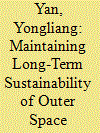|
|
|
Sort Order |
|
|
|
Items / Page
|
|
|
|
|
|
|
| Srl | Item |
| 1 |
ID:
147525


|
|
|
|
|
| Summary/Abstract |
China's manned space station project was officially approved in September 2010. Under a space development strategy at the state-level, an unmanned modular space station, Tiangong-1, was launched on September 29, 2011 and Tiangong-2 is scheduled to be launched in 2016. According to the China National Space Administration (CNSA), China is targeting 2022 for the orbiting of its space station, which will establish China as the third country that has independently constructed and operated a space station. In this article, the feasibility of different models of jurisdiction for this space station is examined, namely the Soviet Salyut, Sino-ISS, European Space Agency (ESA), and China-led models, which take into account the various factors that are not only limited to legal issues. After exploring the advantages and limitations of these models of jurisdiction, it is argued that due to legal, political, financial and technological reasons, a model of jurisdiction that is led by China is the ideal model for the impending space cooperations of China. Based on the above proposition, it is concluded in this article that China should be pragmatic towards space legislation in terms of space commercialization, and the most critical legal issues need to be given prior consideration, i.e. intellectual property protection, export control and dispute resolution mechanisms.
|
|
|
|
|
|
|
|
|
|
|
|
|
|
|
|
| 2 |
ID:
169297


|
|
|
|
|
| Summary/Abstract |
This article provides a summary on the origins of the concept of the long-term sustainability of outer space activities (LTSOSA) by reviewing previous discussions related to the definition of this concept with the conclusion that the LTSOSA is in fact derived from the concept of sustainable development and comprises 5 legal elements, including the principles of intergenerational equity, sustainable use, intragenerational equity, integration, and peaceful purposes. In this regard, the LTSOSA to some extent has been already reflected in international environmental law and international space law. This article, therefore, argues that to enhance the LTSOSA, the Asia-Pacific Space Cooperation Organization (APSCO), which is a regional intergovernmental cooperative organization, has to embrace an LTSOSA regime because of its own interests, the need to fulfill its international obligations that have been imposed by international environmental law and international space law, and the need for regional efforts, which can complement both national and international efforts. Finally, it is concluded that the APSCO should establish internal legal regulations that address issues related to the LTSOSA, at least those that take into consideration space debris mitigation, space weather, space traffic management, capacity building (especially the transfer of space-oriented environmentally sound technology), and radio frequency interference.
|
|
|
|
|
|
|
|
|
|
|
|
|
|
|
|
|
|
|
|
|